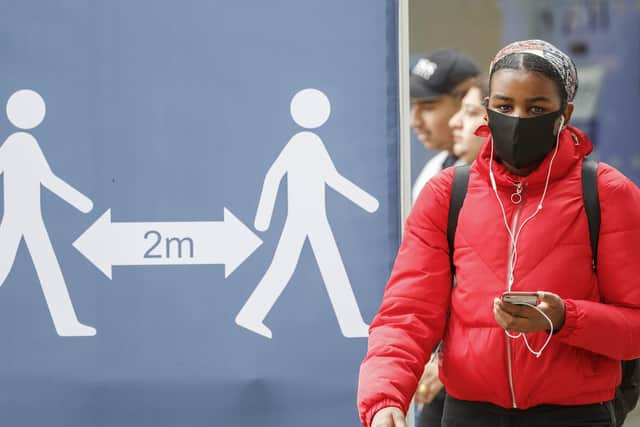Ban on household mixing in England could be coming very soon, says academic
Waiting just two or three weeks to implement such a measure would be too late, Professor Peter Openshaw, professor of experimental medicine at Imperial College London warned.
Such a ban has been announced in Northern Ireland and Scotland while in Wales a maximum of six people are allowed to meet indoors but they must be part of a single extended household.
Advertisement
Hide AdAdvertisement
Hide AdBoris Johnson stopped short of announcing such a measure on Tuesday for England, where the rule of six – introduced last week – means up to six people from multiple households are allowed to meet indoors and outdoors.


Asked on BBC Radio 5 Live’s The Emma Barnett Show about a ban on household mixing, Prof Openshaw said: “I think that may well be coming very soon.”
On timing, the professor, who is a member of the New and Emerging Respiratory Virus Threats Advisory Group (Nervtag) which advises the Government, said: “Well, I would think if we wait two or three weeks, it will be too late. It ought to be instituted sooner rather than later.
Asked if the Prime Minister had gone far enough with the new measures he announced on Tuesday, the professor said: “I think looking from the lens of somebody who is concerned about health, probably not.”
Advertisement
Hide AdAdvertisement
Hide AdHe said: “We do know that the major transmission events are happening indoors in situations where maybe there’s poor ventilation and you can’t observe proper separation of two metres. It is clear.”
Meanwhile a member of the Government’s Scientific Advisory Group for Emergencies (Sage) said the latest measures for England have not gone “anywhere near far enough”.
Professor John Edmunds said action had not been taken quickly enough back in March and that “mistake” is about to be repeated.
Speaking in a personal capacity to BBC Radio Four’s Today programme, he said: “I suspect we will see very stringent measures coming in place throughout the UK at some point, but it will be too late again.”
Advertisement
Hide AdAdvertisement
Hide AdProf Edmunds, dean of the Faculty of Epidemiology and Population Health at the London School of Hygiene and Tropical Medicine, said stringent measures need to be put in place “as fast as possible”.
He said even the stricter measures in Scotland and Northern Ireland may not even be enough, adding: “I think we will continue to see an increase of the epidemic”.
Asked if there was a realistic chance the R – the number of people that one infected person, on average, will pass the virus on to – could be brought under 1 by Christmas, he said: “I suspect not. There’s a chance, of course there’s a chance.”
The comments calling for stronger measures come after a group of doctors and academics earlier expressed concern over the Government’s suppression strategy, urging targeted measures such as segmentation and shielding of vulnerable groups to be adopted instead of local or national lockdowns.
Advertisement
Hide AdAdvertisement
Hide AdAsked about disagreement and debate among scientists, Prof Openshaw said: “I think it is a minority view that we should allow this virus to just rip through society and create so-called herd immunity. I think that that is not the way that the majority of scientists would side in this debate.”
Asked if scientists with that view looked like anti-vaxxers, he said: “I would liken it to that situation.
“I think it is wrong to say that we should let this virus just go and infect a large number of people in certain sections of society in order to create immunity.”
He told The Emma Barnett Show there is “every prospect” that there could be at least one vaccine found to be safe and effective by Christmas, adding: “That’s a much better way to generate immunity than letting the virus just go wild.”
Advertisement
Hide AdAdvertisement
Hide AdFollowing the comments from Prof Edmunds and Prof Openshaw, the Prime Minister’s official spokesman said: “There are also scientists on the other side of the argument saying that we have gone too far.
“There will always be a range of scientific opinion. The Prime Minister has canvassed the full range of scientific opinion in the formulation of this package and we believe that it has a significant role to play in driving down the rate of infection.”
Comment Guidelines
National World encourages reader discussion on our stories. User feedback, insights and back-and-forth exchanges add a rich layer of context to reporting. Please review our Community Guidelines before commenting.